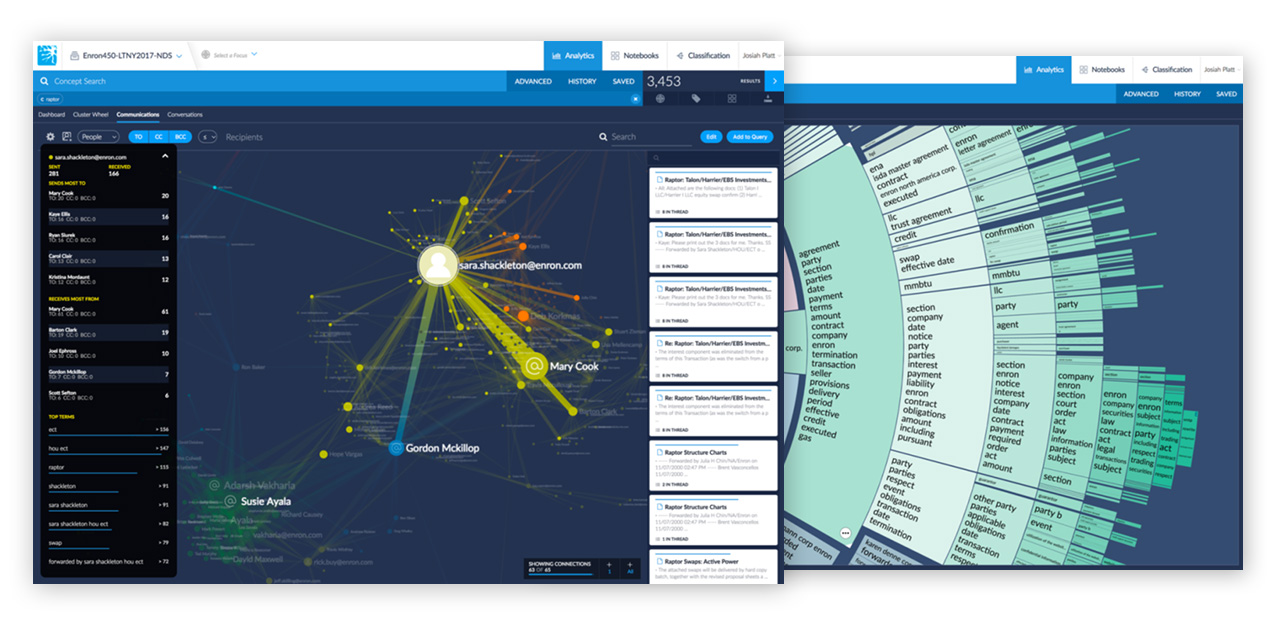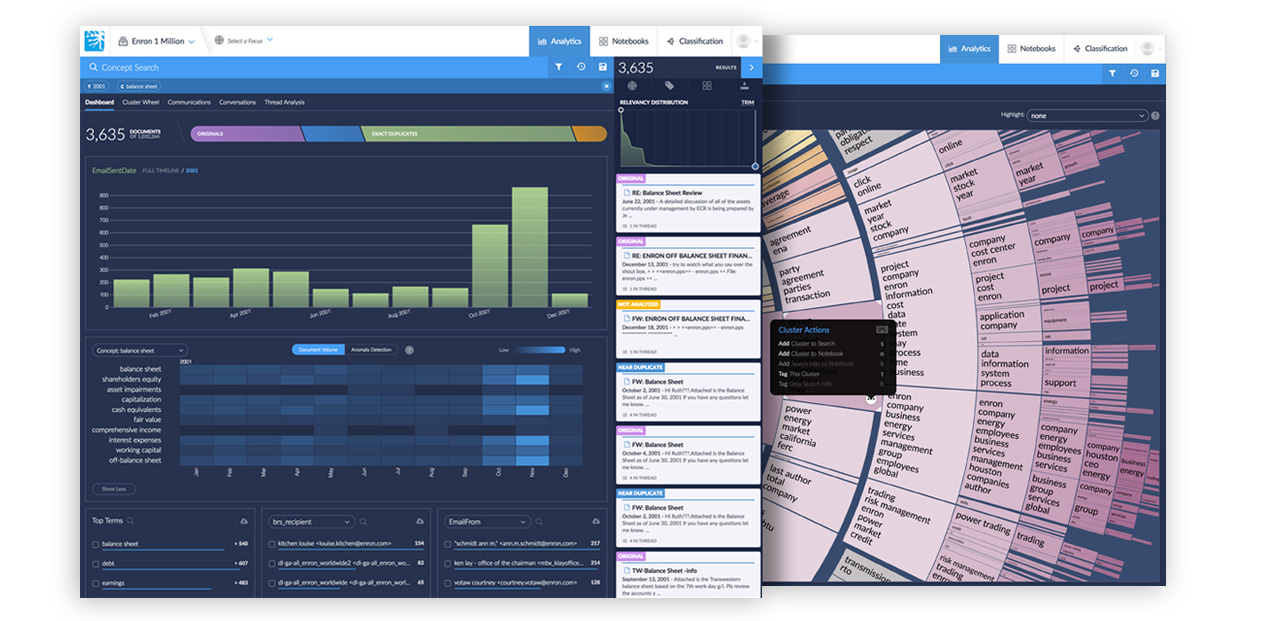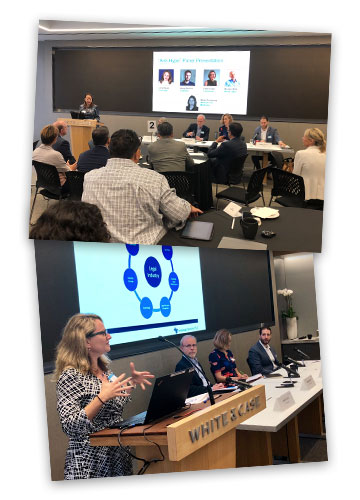Tomorrow’s world todayx
The Reporter discovers how we’re prioritizing innovation to meet the needs of our business, our people and our clients.
Innovation – in response to a growing expectation from clients, we are improving how we deliver legal services through a combination of talent, technology and smarter working.
Our approach to innovation has already won external recognition having been shortlisted at the Financial Times’ Innovation Awards 2018, but we continue to strive to help our clients maximise value for money and efficiency.
Overall, our approach to innovation is centered around three pillars:
Legal technology and knowledge management
Chief Knowledge Officer Oz Benamram says: “As a Firm, we’re always looking for ways we can improve the value and efficiency we provide to our clients. This instinct is ingrained in our existing knowledge-management practices, from professional support lawyers embedded within practice groups, to tools like iManage and Firm-wide search.
“But reaching the next level of innovation that clients are now demanding requires more. It requires a culture of innovation where we work with our clients, our lawyers and our business services professionals to identify opportunities and deliver solutions that meet their needs.”
One way we’ve addressed this is through the creation of a dedicated Practice Innovation team responsible for identifying, exploring and implementing solutions that can help us improve the way we work.
Practice Innovation Senior Manager Monet Fauntleroy says: “Adoption of any new solution is generally driven by three things – client and lawyer demand, the use of technology in the legal market, and what’s happening in the wider technology space.”
The Practice Innovation team works alongside our Knowledge & Technology Committee, made up of lawyers across the Firm, which helps to ensure our approach to innovation is always driven by lawyer and client insight.
Oz says: “The Committee is our sounding board and gives us guidance on the sort of solutions the Firm needs. Being integrated with the practices is critical, because we want to introduce solutions that meet specific business needs, so we need to get their buy-in from the start.”
Partner Greg Spak, who chairs the committee, says: “After looking at what our clients and peers are doing to innovate within their own organizations, we chose a path forward that makes sense for White & Case and our culture.
“The Practice Innovation team is rapidly showing results and drawing more and more lawyers into its efforts.”
Products we already use on the transactional side include an AI-powered due diligence solution for reviewing transactional documents, Luminance, which can be pre-trained to recognise provision and document types in a data set, helping speed up and improve the accuracy of review.
“The Practice Innovation team is rapidly showing results and drawing more and more lawyers into its efforts.”
For example, we recently represented an international technology and manufacturing client in a high yield debt offering in which the due diligence required a team of lawyers in five White & Case offices to review thousands of documents in eight languages. Using Luminance, the team was able to complete this review in a matter of days.
Other transactional solutions at the Firm include the legal review and contract negotiation tool LawGeex, the document automation solution Contract Express, and legal proofreading tool Contract Companion.
On the disputes side, our legal technology earned the Firm a ‘Highly Commended’ at the Financial Times’ Innovation Awards 2018.
Director of Practice Technology and eDiscovery Counsel Janet Sullivan explains: “In the past two years, White & Case has created a global disputes practice-technology strategy, which includes best-in-class tools, creative licensing solutions for clients, and a seasoned technology and project-management staff.”
Our offering is truly global as we use data centers in the US, UK, Frankfurt, Berlin and Moscow, with Asia coming online this year.
One of our core tools is an advanced analytics solution, Brainspace, that uses sophisticated algorithms and machine learning to distil large data sets such as email or chat/IM communications to learn who was talking to who, about what, and when.

Examples of Brainspace in action include a banking matter with 20,000 documents that needed second-level review. We estimate it cut the time taken to complete the review by a third.
In a separate bankruptcy matter, we quickly identified gaps and potential deletions in the data set and identified 69 relevant documents within the first few hours of analysis.

In addition to Brainspace, we offer the industry-leading document hosting and review platform, Relativity; a document review solution tailored for international arbitration, EDT; and a trial preparation collaboration tool, Opus 2 Magnum.
These technologies all positively impact the bottom line. As Janet notes: “Return on investment, for both the firm and our clients is important when implementing a global strategy for disputes technology. We have been able to align with the firm’s strategic plan for profitable growth in that regard.”
To find out more about the solutions available and whether they might benefit your team or matter, contact the team at ai@whitecase.com

We hosted Practice Innovation events in New York and London for lawyers and clients to hear from legal-tech vendors and industry insiders.
Legal Project Management
Legal Project Management (LPM) is another innovation we are using to drive efficiencies, track budgets and give greater transparency on fees to a select group of clients or on particularly complex matters.
Jo Hawkins, Head of the Legal Project Management team, says: “By using our LPM best practices we can give our partners a complete overview of the matter, so we can identify issues or opportunities early.
“LPMs are something that our clients increasingly demand. They not only increase the value of the legal service we give to clients, but also work with partners to improve profitability.
“Overall, introducing LPMs for select clients or matters can improve transparency and communications, capture organizational efficiencies, and reduce costs by freeing up partners and senior associates to focus on the more substantive legal work. It can benefit the client, the lawyers and the Firm.”
The concept of Legal Project Managers has been trialled in the Firm since mid-2017, with the number of LPMs to be increased to six, covering key clients including Pfizer and GSO.
The value of the role was highlighted on a US Department of Justice prosecution case where having an LPM helped the legal team manage the document and audio review , maximise productivity, keep track of budgeting and update the client on fees and billing, and manage third-party provider relationships, so the legal team could focus on the matter in hand.
The LPM team also assisted in creating and managing an evidence-tracking system that summarized the key defense themes used and relied upon during the trial.
During the 12-month period when the most intense work was being undertaken, the LPM support saved an estimated US$1.14 million.
London Partner Jonathan Pickworth says: “LPM has made a real difference, freeing up the lawyers to do what they do best.
“It has achieved what I thought was impossible – delivering cost benefits to the client while improving profitability.”
Cost-effective legal support
While technology, knowledge management and legal project management all deliver substantial cost efficiencies, we’ve also explored innovative ways of staffing matters, so we can pass on cost efficiencies while still providing a top-class service.
Examples include:
- Outsourcing and insourcing of non-core functions to produce cost-efficient services
- Sourcing lawyers from areas of our network that have lower costs and billing rates than other offices
- Leveraging the benefits of our shared-services centers in Manila and Tampa for high quality business support functions
- Using in-house attorneys for eDiscovery/document review at a lower cost than using White & Case junior associates.
One client who has benefitted from our innovative approach is a leading technology company. With this client we use White & Case lawyers and trainees in locations such as Prague and Moscow to conduct first-level document review for lower hourly rates, supervised by the core matter partner team.
For another client, we use contract lawyers to conduct document reviews, draft memos and review complaints.
We carefully hire these contract lawyers—seeking multilingual professionals, in particular—through a closely vetted third-party supplier, perform a thorough conflicts check for each one and then completely embed them in our legal team to ensure there is no noticeable difference in service quality.





